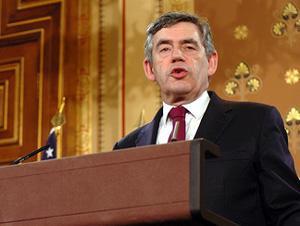Britain supports civil nuclear program for Iran
UK Prime Minister Gordon Brown (Image: Foreign and Commonwealth Office, Creative Commons)
The Obama administration, like the Bush administration before it, is dead set against Iran developing a nuclear weapon. But President Obama has signaled more flexibility toward Iran than his predecessor did. Still, even Mr. Obama hasn’t put it quite so bluntly as British Prime Minister Gordon Brown did recently.
On "The World," BBC diplomatic correspondent Jonathan Marcus reports on reaction to a statement made by Mr. Brown in which he said all countries, even Iran, have the right to nuclear power.
The statement was part of a speech in which the Prime Minister championed nuclear energy as the way to save the planet from climate change: "Let me be unequivocal. Iran has the same absolute right to a peaceful nuclear program, civil nuclear program as any other country. Indeed the UK and the international community stand ready to help Iran achieve it."
According to Marcus, there has been an international consensus against any attempt by Iran — which of course it denies — that it should develop a weapons program: "But if the price of that is to assist Iran on its way with its power-generating capability, then I think most of the Western powers would be happy to do that. Of course, that would require Iran to give up its uranium enrichment program, which is the central bone of contention between Iran and the United States and a number of America’s allies. Of course, as you heard there, the British Prime minister was really making Iran an offer: if you play by the rules, then by all means you can of course have a civil nuclear power. But he took a different stance when it came to Iran’s current nuclear program."
Gordon Brown: "Iran’s current nuclear program is unacceptable. Iran has concealed its nuclear activities, refused to cooperate with the IAEA, flouted UN Security Council resolutions, and it’s refusal to play by the rules leads us to view its nuclear program as a critical proliferation threat."
Marcus: "I think to a large extent, everyone in Europe is looking towards America to see how this proposed opening, this diplomatic opening towards Tehran takes place. What will be the Iranian response? Are the Iranians crucially going to be willing to reign back on uranium enrichment? It’s got to be said that this speech wasn’t just about Iran. I mean, Iran was the critical example that Prime Minister Gordon Brown cited, but in a fundamental sense, it was about a much bigger problem of which Iran is only a part. And that bigger problem is essentially that seen from London, seen by the British government, nuclear power generation is inevitably going to spread around the world. It’s going to spread because of economic development, and crucially it’s going to spread because of fears of global warming. And the only ways countries will be able to generate more power is by resorting to nuclear means. And of course, the great fear is that the international non-proliferation machinery – the bundle of treaties and agreements that tries to stop the nuclear know-how leading to the ability to have nuclear weapons – that machinery is seen as being in very bad repair for a whole variety of reasons. And therefore, what the Prime Minister was trying to do today is to say, ‘Look. We have to grapple with all these issues together because they’re all interlinked.’"
As for whether there is any daylight between Gordon Brown’s proposals and the position stated so far by Barack Obama here in the US, Marcus says: "I don’t think so, fundamentally. I don’t think this is so much a question the Europeans are asking the Americans to do the heavy lifting for them. I think it’s simply a fact that the sorts of things that Iran wants by and large can’t be granted by the Europeans. Europe can assist, it can be involved in all sorts of economic relations with Tehran, but of course the fundamental debates and discussions have to come between Washington and Tehran about threats to Iran, about fears the Iranians have that the Americans simply want regime change there, that Iranians want to see their regional position as a major player acknowledged in some way, and of course, the United States crucially wants Iran to be less of a disruptive actor in the region, certainly as far as the Obama administration sees it there. There’s no difference between Mr. Obama and his predecessors in the White House. So I think it’s not so much leaving it all to the Americans, but the things Tehran really wants to talk about are very much things where the only address can be Washington, DC."
PRI’s "The World" is a one-hour, weekday radio news magazine offering a mix of news, features, interviews, and music from around the globe. "The World" is a co-production of the BBC World Service, PRI and WGBH Boston.
Every day, reporters and producers at The World are hard at work bringing you human-centered news from across the globe. But we can’t do it without you. We need your support to ensure we can continue this work for another year.
Make a gift today, and you’ll help us unlock a matching gift of $67,000!
